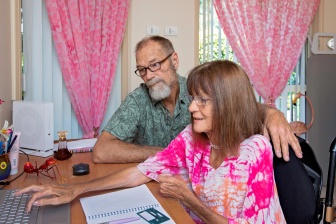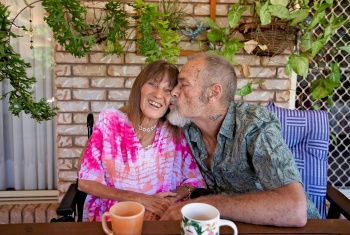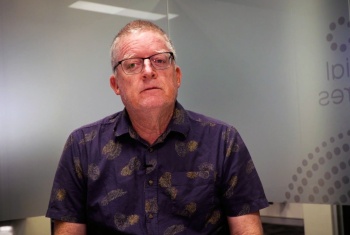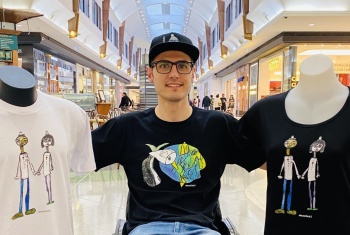Like 29% of National Disability Insurance Scheme (NDIS) participants, Gill Godfrey self-manages her plan.
This gives her flexibility and choice to decide what supports she buys to help her live her best life.
Gill, of Fernvale Queensland, lives with spinal muscular atrophy, which affects her mobility, strength, and coordination.
‘I can’t stand anymore, sitting is getting harder, and swallowing is difficult,’ Gill says.
The grandmother of 7 children needs support workers to help her with daily tasks at home and to access her community. She recruits and employs them directly, not through an organisation.
Like most employers, she talks to her carers face-to-face to clarify expectations and sort out any issues.
‘I can hire whoever I want. They do not have to be registered providers. That can save a lot of money,’ she says.
With the help of an occupational therapist, Gill also purchased her own NDIS-funded assistive technologies, including a motorised wheelchair, adjustable bed, and a hoist to help support workers and family carers lift her.
Gill says she is careful about how she uses her NDIS funds.
She keeps the receipts and claims expenses back from the National Disability Insurance Agency. Payments are deposited into Gill’s bank account from her NDIS budget.
As a self-managed NDIS participant, Gill does not need regular contact with Local Area Coordinators, except for occasional advice.
‘Mostly I manage on my own, but when I needed to get some equipment fixed, I wasn't sure about how to use my funding for that, so I went to my Local Area Coordinator team,’ she says.
‘The NDIS website is really good. It explains everything about self-management, and you can access the NDIS Guide To Self Management booklet.
‘If you can do online banking, you can manage your own NDIS plan.’
‘I encourage all participants and carers to download the NDIS app and look through it, she says.’
Gill believes one of the main benefits of self-management is knowing her support workers are happy because they are paid promptly.
She has found independent support workers through social media and is part of the 97 per cent of participants aged over 15 who said they felt happy with their relationships with staff who work with them.
‘There are so many helpful pages out there. I posted in one called Disability Support Workers Hub with the days and times I needed help,’ Gill says.
Gill got 50 responses and thought that was good considering she lives in regional Queensland.
Despite being happy with her results, Gill advises other participants recruiting their own support workers to be careful.
‘It’s important for self-managers to know what questions to ask. Most of my applicants were qualified but a few didn’t have qualifications or a police clearance. Always check the ABN is registered to their name,’ she says.
Gill acknowledges that finding staff can be the main challenge for people looking to self-manage. But if this is a problem, a Local Area Coordinator can assist.
Gill has helped others in her local area by offering informal advice about self-management.
‘I was one of the first in my area to get the NDIS. The Facebook community pages were full of people asking for advice, so I reached out and helped them,’ she says.
Gill was surprised to learn there were so many people living with disabilities in her area. So she formed a group to share information and resources.
‘We live out of town, so if someone wants a physiotherapist, 4 or 5 of us group together to get one out to see us,’ Gill says.
Gill’s life has been transformed by the NDIS.
With the help of NDIS-funded support workers, she is out and about in her community.
‘I cannot praise the NDIS enough,’ she says.



